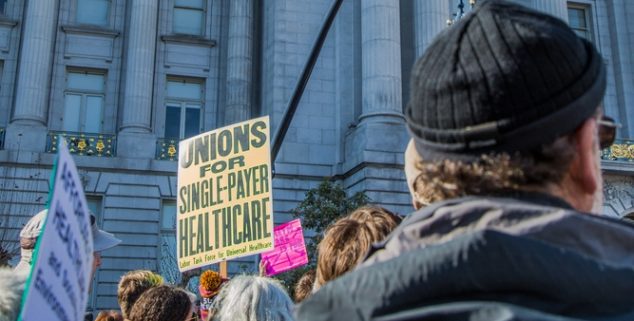News
Single-payer dies ignominiously, but what’s next?
 Single-payer advocates rally in San Francisco. (Photo: Kim Wilson, via Shutterstock)
Single-payer advocates rally in San Francisco. (Photo: Kim Wilson, via Shutterstock)For at least the immediate future, single-payer health care in California seems dead. It died on Jan. 31, when its author withdrew legislation creating it from the Assembly floor, citing insufficient votes.
But there are rumblings. And since nothing ever seems to die in the Capitol, the question now being asked is: After being sidelined in the Legislature, will single-payer make a comeback in California?
Probably, say both backers and opponents.
“This is only a pause for the single-payer movement. We will not give up,” says Assemblyman Ash Kalra, (D-San Jose ), the author of AB 1400, the single-payer “CA Guaranteed Health Care for All Act,” or CalCare. Despite the determination, however, he declined to allow the full Assembly to even vote on the bill, citing a lack of support.
Ned Wigglesworth, spokesperson for Protect California Health Care, which opposes single-payer, isn’t so sure if the plan can be resuscitated.
“Tough to say whether it comes back,” he told Capitol Weekly. “Nothing can change the overwhelming structural problems it faces: $160-plus billion per year in higher taxes, no ability for consumers to opt out, no guarantees patients can keep their doctor and no certainty the federal government will allow or maintain the $200+ billion in federal funding needed every year – on top of the taxes. “
Single-payer is a system in which all medical bills are paid by one entity — in this case, the government. Universal health care is similar with access to health care assured, although billing can be covered jointly by an array of entities, such as government, insurers and health care providers.
Polls have have shown support for a single-payer program in Democrat-dominated California.
A May 2021 survey commissioned by Physicians for a National Health Policy — supporters of single-payer — noted that four out five likely Democratic and progressive voters in California favor Medicare for All and single-payer.
But earlier this year, a poll conducted by the California Agents and Health Insurance Professionals — opponents of single-payer — found that nearly three out of four Californians are satisfied with their current health care coverage and that nearly two-thirds oppose a single-payer system.
In 2018, the nonpartisan Public Policy Institute of California, which regularly takes the temperature of the electorate, found that a narrow majority, or 53 percent, favored single-payer, but when the price tag was included, that support dropped to 41 percent.
The California Association of Health Care Plans, which represents HMOS and other health care organizations, says seven in ten (73 percent) of California voters are satisfied with the health care they receive.
Meanwhile, just three days before the Assembly was scheduled to vote on Kalra’s bill, the Democrats’ progressive wing said they would pull endorsements from any Democrat who opposed the measure.
That put Democrats in a tough spot, and they vehemently complained to Kalra: It’s an election year and nobody wants to go into their districts supporting a plan with a $168 billion price tag. Nothing is spent unless a separate measure, a constitutional amendment, is approved by voters but that detail can get lost in the heat of an election campaign.
Preston Young, lobbyist for single-payer opponent California Chamber of Commerce, predicts a comeback:
“We are relieved AB 1400 will not move further for now. However, we expect that the ideas put forth in this dangerous proposal will resurface in the future.
“We stand ready — alongside a large, diverse and growing coalition — to oppose proposals like AB 1400 that will levy huge taxes on Californians and disrupt the health care that 40 million residents rely on,” Young told Capitol Weekly
More evidence that the issues is still alive, if now underground, comes from the pro-single-payer California Nurses Association, which exploded with anger when Kalra refused to bring the bill to the floor.
“Nurses are especially outraged that Kalra chose to just give up on patients across the state. Nurses never give up on our patients, and we will keep fighting with our allies in the grassroots movement for CalCare until all people in California can get the care they need, regardless of ability to pay,” the association declared in a statement.
“Nurses condemn this failure by elected representatives to put patients above profits, especially during the worst surge of Covid-19 yet, at a time when it’s more clear than ever before that health care must be a right, not just a privilege for those who can afford it.”
Single-payer universal health care may be argued about in California for the foreseeable future, but in neighboring Canada, it has long been a fact-of-life, beyond dispute, and pretty much untouchable.
“For politicians to oppose our present taken-for-granted health care system is surely a suicide,” says Elvi Whitaker, retired professor of anthropology from the University of British Columbia and astute observer of Canadian and California politics “Yes, our taxes are higher, but no one would argue to have health care changed to what you have.”
One thing seems sure. While single-payer won’t be argued about in legislative committees or on the Assembly or state Senate floors, it will be the subject of behind-the-scenes discussion for at least the coming year and perhaps beyond.
Want to see more stories like this? Sign up for The Roundup, the free daily newsletter about California politics from the editors of Capitol Weekly. Stay up to date on the news you need to know.
Sign up below, then look for a confirmation email in your inbox.

Leave a Reply